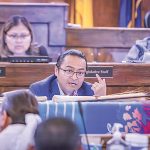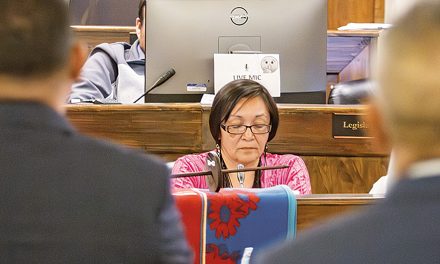
Doctors: Second wave of virus a ‘dire situation’
Navajo Area IHS facing critical shortage of hospital beds, staff, supplies, oxygen
WINDOW ROCK
In President Jonathan Nez’s town hall on Thursday, Navajo Area Indian Health Service doctors on the front lines of the coronavirus pandemic painted a dire picture, citing a health care system in crisis and medical and nursing staff stretched to their limits amidst an alarming surge in cases.
“As an infectious disease specialist, I am very concerned about this second rise in COVID-19 cases that we’re seeing locally,” said Dr. Jonathan Iralu, IHS infectious disease consultant. “It’s gotten to the point where our facilities are deeply challenged and getting overwhelmed.”
Chief Medical Officer Dr. Loretta Christensen said while the Navajo Area IHS is expanding bed capacity and staff, they are now competing with health care providers across the United States for “very critical supplies” and medications that patients need for treatment, including oxygen.
They also are having trouble transferring patients who need a higher level of care because regional hospitals are nearing capacity and are facing the same issues with COVID-19 raging into uncharted territory.
“This creates for us a challenge for us to get our patients to those hospitals that need intensive care treatments,” Christensen said.
“What we know is that our hospital beds are full and when we try to send persons to other hospitals in New Mexico and Arizona they are essentially 100% full,” said Iralu.
In response to these reports, President Jonathan Nez announced he will be signing a major disaster declaration request to the White House for President Donald Trump’s approval and which could bring in additional resources.
The Nation will also be extending the stay-at-home order and curfews in a forthcoming revised public health order, he said.
Unprecedented since Spanish flu
Dr. Ouida Vincent, clinical director at Northern Navajo Medical Center Service Unit, said what they are seeing is unprecedented since the (Spanish) influenza pandemic of 1918.
Her biggest concern is the potential for rationing resources if demand exceeds supply.
She said, for example, NNMC is constrained by the size of the facility and the number of hook-ups for high-flow oxygen support, which many COVID patients require for a prolonged period of time.
Last Friday, they had too few high-flow oxygen machines for the number of patients needing them, she said.
“We were able to make adjustments, but it was traumatic for staff,” said Vincent.
She said, with a 50% vacancy rate, they are “really challenged” with a shortage of nursing staff and are onboarding contract nurses as quickly as possible to fill the gaps.
“We are trying to stretch our resources as far and as fast as we can,” said Vincent.
NNMC is also planning to expand the ICU and the public health emergency ward, which is currently full, and are mobilizing staff from other health facilities to do that.
Meanwhile, they are transferring multiple patients daily to other hospitals, including in Durango and Colorado Springs.
Dr. Eric Ritchie, Chinle Service Unit chief medical officer, said at Chinle hospital capacity is close to being “maxed out” and regardless of how much more capacity they build, there are still specialized medical care services that patients need from bigger hospitals.
“We are all here today to share with you that our hospitals are reaching a breaking point and a point of crisis with the number of patients that we’re having to see, both for COVID-19 and non-COVID care,” said Ritchie.
“Having a health care system that’s overwhelmed is not beneficial to anyone seeking care, whether they have COVID or not.”
‘Stretched to the limit’
Dr. Paula Mora, Gallup Indian Medical Center clinical director, said this second surge is very different from the first one in the spring.
“At the beginning of the pandemic, we had to work to find PPE for our staff, and now, with the increased patients coming in, we’re trying to locate enough oxygen,” she said.
Mora said in “the first wave,” they had the opportunity to transfer patients to facilities in Albuquerque, but that option is no longer available.
“Our regional resources are being stretched to the limit,” she said.
With hospitals near capacity, patients are facing extremely long delays in the emergency department as well, she added.
“When you have those delays, it puts our entire community at risk,” said Mora.
Gallup Indian Medical Center Emergency Department Director Dr. Paul Charlton said they are already at the point where care is being provided in “non-traditional locations” in order for them to try to meet the “unprecedented demands” on the system.
“Many times, we find that there are no beds or locations to admit sick patients to, anywhere in Gallup and the surrounding region,” said Charlton.
With “few or no” locations to transfer patients, even when beds are found, there are often no flight teams available to transfer them, he added.
“The regional hospitals are doing everything they can to help but it really is a dire situation that is starting to have significant personal impacts on the care that we provide,” said Charlton.
‘We need your help’
Charlton urged everyone to take COVID-19 seriously and to follow public health recommendations to minimize the risk of contracting the virus.
“Even at your home, if someone comes into your dwelling that doesn’t live with you, it’s still not safe,” said Ritchie. “You may need to wear a mask even within your own home.”
Ritchie emphasized that a negative COVID-19 test “is not permission” for people to go about their regular business as if things were normal.
“These are not normal times,” said Ritchie. “Having a negative COVID test doesn’t guarantee that you don’t have the disease. It doesn’t even guarantee that you can’t get it tomorrow, or within the next few hours.”
Nez said there are isolation sites available in Gallup, Chinle, Shiprock, Tuba City, and Winslow, including alternative care sites and hotels, and he encourages people to reach out if they need help finding a place to isolate or quarantine.
“Don’t be ashamed,” said Nez. “We don’t want to spread this virus.”
Offering words of encouragement and caution, Dr. Michael Tutt, chief medical officer at Tsehootsooi Medical Center, said the day will come when the pandemic is over, but, for now, he advises everyone to stay at home as much as possible.
“There’s a vaccine coming,” said Tutt. “Don’t be afraid of it because it will protect you from this virus. I’ll take the vaccine too because I don’t want to get sick and, as a Diné, I don’t want to pass it on to somebody.
“But in the meantime, yes, it is difficult,” he said. “We can’t get together. Just stay put and don’t let anybody come to the house, even your relatives, even your friends.”
Nez said we’re all in this together and everyone has to do their part.
“We need your help,” he said. “You have the power to stop this virus. The Navajo Nation, our doctors and nurses, our elders, and our frontline workers need your help. Let’s help save lives.”
As a public service, the Navajo Times is making all coverage of the coronavirus pandemic fully available on its website. Please support the Times by subscribing.
How to protect yourself and others.
Why masks work. Which masks are best.
Resources for coronavirus assistance








 Highway 264,
Highway 264, I-40, WB @ Winslow
I-40, WB @ Winslow